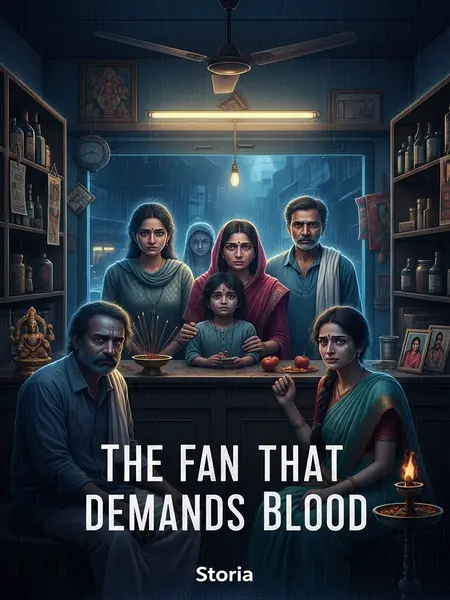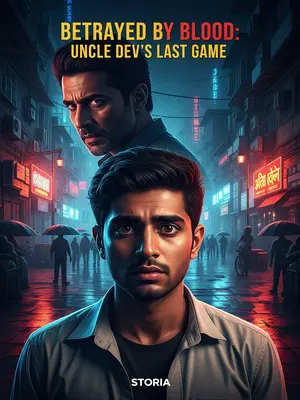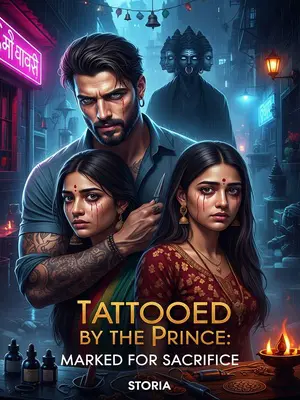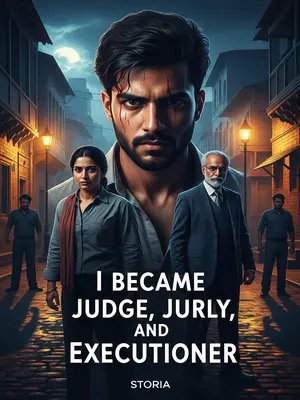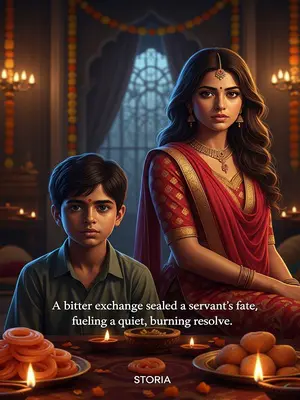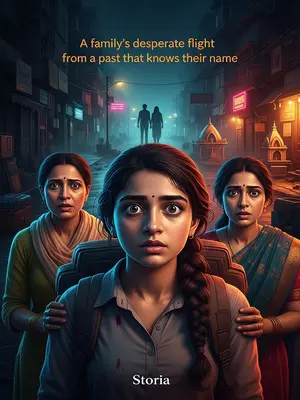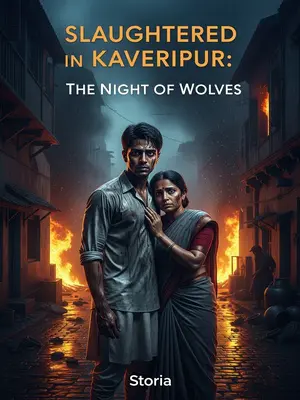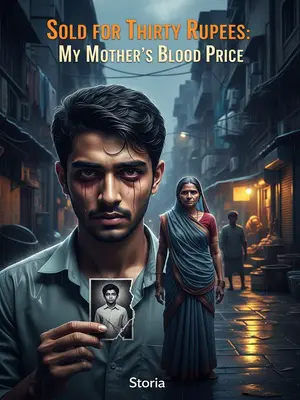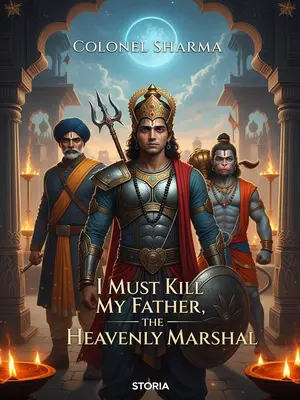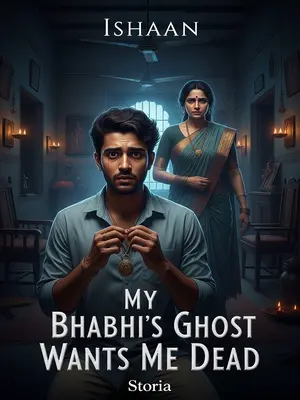Chapter 1: The Beggar’s Warning
When I was a child, an old beggar came to our shop. In a voice rough as gravel, he asked, 'Kisi ki maut hui hai na, iss dukan mein?' His presence filled the air with a chill that settled deep in my bones.
The memory of that day returns as sharply as the ringing of our shop’s bell. Our family’s kirana shop—glass jars brimming with Parle-G, the tang of dried dal hanging in the air—was unusually still, save for the beggar’s cracked voice. Outside, the paanwala’s radio played an old Kishore Kumar song, its notes drifting in with the smell of wet earth and frying samosas from the next lane. My grandfather, startled, took a moment before replying, 'Do saal pehle, humne naya ceiling fan lagaya tha dukan mein. Padosi sab dekhne aaye the. Mera doosra beta lamba tha, aur hamesha fan ke niche baithta, bolta tha thanda lagta hai. Raat ko khana khakar, fan ki taraf dhyaan nahi diya. Jab khada hua, fan ne uska sir kaat diya, aur khoon zameen par fail gaya.'
Grandfather’s words, usually gentle and steady, came out brittle as a papad. I remember how his fingers trembled with each syllable, the way my uncle’s faded photo on the wall seemed to frown, and how my grandmother, shelling peas in the corner, suddenly stopped, staring at the beggar with wide, suspicious eyes. For weeks after, we didn’t use the fan at all, and neighbours would whisper behind their palms when we passed by the shop.
The old beggar spoke in a voice that sent a chill through the air: 'Woh abhi bhi iss dukan mein hai. Aaj raat barah baje, woh bahar niklega aur nuksan karega. Tayyar ho jao.'
There was something about his words, some weight that raised goosebumps along my arms—like the time a black cat darted across the road as we left for a wedding.
As soon as the beggar finished, a deafening rumble shook the air.
A clap of thunder sent shivers down everyone’s spine.
We all peered through the shop’s half-rolled shutter at the sky, now turning coal-black. The yellow bulbs above the counter flickered nervously. My grandmother clutched her dupatta, mumbling a quick 'Ram Ram.'
The sky darkened at once, and a cold wind started blowing, icy and biting.
It was the kind of wind that crawled under the shop’s wooden door, bringing with it the sharp scent of wet mitti and a chill that curled up your spine. Somewhere far off, a stray dog howled, its cry shivering through the night air.
My grandfather’s brow creased with worry as he pleaded, 'Baba, hamara poora ghar isi dukan par tikka hai. Koi raasta batao, bhagwan ke liye.'
His voice quivered, the same way it did when he’d beg the postman to wait for chai, or pleaded with the local MLA for a new electricity meter after another power cut.
The old beggar squinted, then produced a scrap of red cloth from his pocket and spoke in a hushed tone, 'Yeh kapda mukhya beam par baandh do. Ek katora saaf paani ka rakhna. Raat bhar, chahe kuch bhi awaaz aaye, neeche mat aana. Sab upar chipke rehna, subah hone tak intezaar karo. Subah paani ka rang dekhna—agar badla nahi, to samajh lo sab theek.' He whispered something in Bhojpuri, too fast for me to catch, before thrusting the red cloth into Dadi’s hands.
The beggar’s hands shook as he handed over the cloth, nails ringed with dirt, his eyes darting to the sky. Grandmother immediately touched her thumb to her forehead—a habit whenever someone mentioned death in the house—before passing the cloth to grandfather, whispering, 'Ya Allah, agar sach bol raha ho toh?'
Without another word, the beggar limped away, his feet slapping against the wet street. For a moment, it felt as if he’d taken the last bit of warmth with him. The tinkle of his anklet faded, lost in the roar of the oncoming storm.
My grandfather and grandmother exchanged a worried glance. She pressed her lips together, the way women do when they don’t want to cry in front of children, and asked, 'Arrey suno, kya sach mein yakeen hai tumhe us bhikhari ki baat par?'
She stood close, voice soft but eyes wide, clutching her green saree pallu tight. The rain on the tin roof above thudded like the heartbeat of our house.
Grandfather’s frown deepened. 'Aise mamle mein, na maanna behtar hai, na na maanna. Pata nahi, lekin bach ke rehna hi samajhdaari hai.'
He said this with the weight of someone who had heard too many midnight stories after weddings and funerals. 'Kya pata, sach ho? Sambhal ke hi chalna chahiye,' he muttered, glancing at the wall of ancestors.
He then climbed onto the old wooden stool and tied the red cloth to the beam with trembling fingers, lips moving in a silent prayer. The scent of incense from the puja shelf mixed with the sharp tang of rain.
The red cloth—red as blood—fluttered in the wind, almost alive. I shivered, remembering stories of such cloths tied to haunted banyan trees, or outside homes struck by tragedy.
Boom! Another thunderclap rattled the glass.
The jar of Aam papad on the counter trembled. My cousin, playing marbles on the floor, jumped and hid behind grandmother, eyes as round as two rupees.
The rain began to pour in earnest.
You could smell the earth turning, the kind of rain that makes you crave hot pakoras and adrak wali chai. Water pooled at the doorstep, muddying the old rangoli.
Grandmother said, 'Buddhe, iss tez baarish mein kaun aayega? Jaldi band kar dete hain.'
She rubbed her arms for warmth, watching as lightning flashed across the cracked wall, illuminating the dusty godown.
Grandfather glanced at the wall clock. 'Abhi to nau baje hain. Bahut jaldi hai band karne ka. Thoda intezaar karte hain.'
He tapped the clock, its tick-tock nearly lost in the drum of rain. In small shops like ours, every hour mattered; sometimes a late customer could make the whole day’s sales.
Just then, a man entered the shop. His face looked like he hadn’t slept in weeks, eyes red-rimmed and wandering, as if searching for someone lost.
He wore a faded shirt that had once been white. His shoes squelched on the wet floor, and he gazed around as if seeing the shop for the first time—yet his eyes lingered on every corner, searching.
Grandfather straightened and asked, 'Beta, kya chahiye khane ko?'
His voice was gentle, as always, treating customers like house guests. He even straightened the empty Limca bottles out of habit.
The man gave a weary half-smile. 'Uncle, do saal pehle bhi aaya tha yahan. Yaad hai?'
His voice was flat, smile never reaching his eyes, something old and hurt lingering beneath his words.
Grandfather hesitated, then forced a chuckle. 'Arrey, itne log aate hain, sabko kaise yaad rakhun?'
He tried to sound cheerful, but I saw his fingers drumming nervously on the counter—he hated forgetting a face.
The man said, 'Do saal pehle, ek bachche ko dhoondhne aaya tha. Kisi se jhagda bhi ho gaya tha, khana khate waqt. Zindagi aur maut ka sawal ho gaya tha.'
The air thickened, like it does when the power goes in summer and the air refuses to move. Even the wall calendar seemed to droop.
Grandfather managed a laugh. 'Ab yaad aaya. Tumhari biwi bhi saath thi tab.'
He offered water from the copper lota, hoping the old custom would smooth the awkwardness.
He asked, 'Bachcha mila tha?'
The man’s half-smile returned. 'Abhi tak nahi, par kuch khabar mili hai.'
Outside, a bike screeched past in the rain, its headlight flooding the shop for a heartbeat.
Grandfather nodded, pressed his lips together the way old men do when they’re nervous, and asked, 'Akele aaye ho?'
'Nah, biwi bhi aa rahi hai. Uncle, do bowl noodles aur aadhi bottle desi daru chahiye. Suna hai yahan ki daru badhiya hai—aaj try karenge.'
The mention of desi daru made grandfather glance at the storeroom door, making sure no one from the chowki was nearby. In small towns, everyone knew who made the best, and it was a quiet point of pride—even if the excise inspector sometimes sniffed around.
Grandfather nodded. 'Theek hai, bana deta hoon.'
He rolled up his kurta sleeves, moving with practiced hospitality.
Then he told grandmother, 'Suno, daru le aao.'
He didn’t even look at her, just jerked his chin toward the storeroom, knowing she was uneasy.
Grandmother nodded, tucking her pallu firmly at her waist, and disappeared behind the curtain, slippers flapping softly against the wet cement.
Grandfather told the man, 'Beta, baith jao. Main backyard mein jakar khana bana ke laata hoon.'
He spoke as if reciting a familiar script, but his eyes lingered on the man a moment longer than usual.
With that, he left for the backyard, leaving only the man and me in the shop.
Suddenly, the shop felt smaller, the walls closing in. From upstairs, the theme music of 'Kyunki Saas Bhi Kabhi Bahu Thi' drifted down, just as Tulsi was about to confront her saas.
The man wiped his face with the back of his hand, leaving a streak of mud, and glanced up at the fan as if recognizing an old enemy. Then he moved with purpose, picking the seat directly under the fan—the very spot the second son had chosen before the accident.
There was something almost ritualistic about it. I remembered how, after the accident, even neighbourhood kids avoided sitting there during hide-and-seek.
Because the weather was overcast and cold, the fan was off.
The air was heavy with the smell of masala and wet jute sacks. The only other sound was the fridge’s hum, blending with the rain’s drum.
But the wind made the fan creak and groan.
Each gust sent it swinging, casting flickering shadows on the chipped floor. It was a sound that usually faded into the background, but tonight, the fan seemed to whisper warnings.
The fan blades quivered but didn’t turn.
It was strange to see them tremble, as if remembering the tragedy, as if the metal itself had learned fear.
The man looked at me and said, 'Arey bacche, zara pankha chalu kar de. Garmi se jaan nikal rahi hai.'
His voice sent chills through me, even though my shirt was already damp with sweat. The way he called me ‘bacche’—not ‘beta’ or ‘babu’—felt wrong, off somehow.
His eyes were unfriendly, his gaze sharp as a knife, making him look frightening.
He stared so intently, I found myself clutching the edge of the counter so hard my knuckles turned white.
I whispered, 'Baarish ho rahi hai, thand hai. Fan kyun chalana hai?'
My voice barely rose above the rain, a dry croak betraying my fear.
